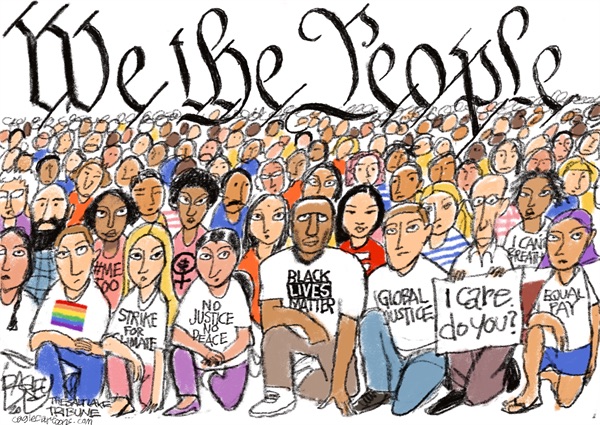If George Floyd Had Lived
The Trials of Black Americans in Santa Barbara

Policing is not the only stage of the justice system that produces racial disparity. Disadvantage accumulates at each step of the criminal justice process and contributes to a disproportionate number of people of color who are incarcerated and criminalized. The Public Defender’s Office is witness to this disparity.
To illustrate, consider what would have happened if George Floyd had lived. In Santa Barbara County, he would have likely been arrested for passing a counterfeit bill and resisting an executive officer. He would have been held in custody on $25,000 bail, an amount that he would not have been able to afford to post. He would have been appointed a public defender. But, in the post COVID-19 world, Mr. Floyd would be quarantined for 14 days in the county jail where his ability to speak with his attorney would be severely limited.
When they finally met, Mr. Floyd would ask his public defender to explain why he was being charged with resisting arrest when he was the victim. His public defender would empathize and tell Mr. Floyd that they see this happen too often. They would talk about his right to a trial. Mr. Floyd’s public defender would explain that they could assert that the officer used excessive force, but that the prosecutor would likely argue that the use of force was justified because Mr. Floyd “didn’t obey their commands.” His public defender would explain that it would be up to a jury to decide his fate.
Mr. Floyd’s public defender would also have to explain the harrowing reality that Mr. Floyd might be the only Black person in the courtroom during the jury selection portion of his trial and the high probability that he would not have a single person on his jury that had the same color skin as he did. This conversation would also entail “strategies” meant to give Mr. Floyd “juror appeal” in this circumstance:
Our office will provide you with a suit and tie. Smile, but don’t look like you’re having a good time. Look at the jurors when they are talking, but don’t stare at them too long.
While these jury selection “strategies” are not specific to Black clients, the conversation would be different in context and tone because of Mr. Floyd’s race.
Mr. Floyd would express his fears to his public defender. Fear that the jury would not believe him over a white police officer. Fear that the prosecutor would vilify him by using his criminal history against him. Fear that he would not get a jury of his peers and that racial bias might taint their deliberations. Fear of the negative impact his prolonged absence in jail awaiting trial would have on his 6-year-old daughter. These would all be valid concerns shared by many Public Defender’s Office clients. Mr. Floyd’s cumulative fears would likely result in him accepting a plea bargain resulting in a felony conviction, and if he was lucky, no more than a year in the county jail and a five-year felony probation grant.
There is a growing consciousness about how discriminatory criminal justice practices affect poor communities and communities of color, and undermine the perceived legitimacy of the criminal justice system. While the Black Lives Matter movement and other grassroots organizations continue to push for greater activism and public awareness around the need for criminal justice and police reforms, the Public Defender’s Office is uniquely positioned to provide the leadership that our local justice system needs to achieve racial equity.
We are the only participants in the criminal justice system with the perspective and the position to make objections, arguments, and demands on behalf of our clients for improved police practices and racial equity in court. If we do not do it, no one else will. If we do not do it, no one else can.
To this end the Public Defender’s Office has organized the Racial Justice Committee — an internal organization comprised of attorneys, investigators, and support staff volunteers that is supported and encouraged by our leader, Tracy Macuga. The committee seeks to build bridges with the community in order to learn how the Public Defender’s Office can better support those who are fighting for racial equity. The committee also seeks input on how to elevate our practice to better address issues within the system and serve communities of color.
The Public Defender’s Office is committed to the elimination of unwarranted racial disparities in the criminal justice system. The Racial Justice Committee is dedicated to making change, not only in this moment, but going forward in establishing sustained and meaningful progress toward equality and humanity. We look forward to working with the community and invite opportunities for collaboration, discussion, and collective action.
Adrian Galvan and Maria Martino are deputy public defenders and co-chairs of the Public Defender’s Office Racial Justice Committee. For more information, please contact us at RacialJustice@publicdefendersb.org



